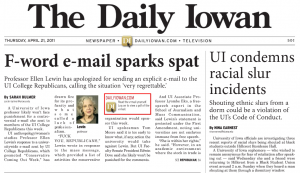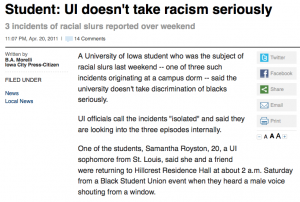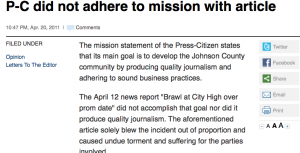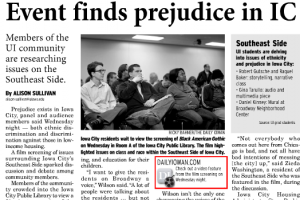 If someone had traveled through Iowa City on Thursday, picked up the local newspapers, and later sat down, asking, “What is this Iowa City place?”, here is a selection of prominent stories they would have seen:
If someone had traveled through Iowa City on Thursday, picked up the local newspapers, and later sat down, asking, “What is this Iowa City place?”, here is a selection of prominent stories they would have seen:
Story 1: A UI student says she and other students have been subjected to racial slurs, including the word Nigger, and that the university “has done nothing about it.”
Story 2: In response to what she considered an offensive use of the idea “coming out” in attracting and promoting campus Republicans via mass email, a UI professor (disclaimer: who I know) responded: “Fuck you, Republicans.”
Story 3: A documentarian screened a film about racism and segregation in Iowa City (disclaimer: I am quoted in the story), which produced debate about culture, perceptions, and race.
Story 4: Technically a letter to the editor, two City High students write that the Press-Citizen misrepresented perceived violence during prom, which is the focus of my previous blog post, below.
Here is my question: Could this day’s papers have revealed the “truthiness” of our community more than, perhaps, an “average day’s” paper full of stories about business, local politicians, and rewritten press releases? I usually would claim that journalists don’t seek or tell the “truth” (truth is, afterall, subjective). But did these stories of social and cultural problems and lack of solutions from within the community touch on something “more real” than “normal news?”


